- Home
- B. V. Larson
Starship Liberator
Starship Liberator Read online
Books by David VanDyke:
Stellar Conquest Series:
First Conquest
Desolator: Conquest
Tactics of Conquest
Conquest of Earth
Conquest and Empire
Books by B. V. Larson:
The Undying Mercenaries Series:
Steel World
Dust World
Tech World
Machine World
Death World
Home World
STARSHIP LIBERATOR
by
David VanDyke
and
B. V. Larson
Copyright © 2017 by the authors
This book is a work of fiction. Names, characters, places, and incidents are either products of the author’s imagination or used fictitiously. Any resemblance to actual events, locales or persons, living or dead, is entirely coincidental. All rights reserved. No part of this publication can be reproduced or transmitted in any form or by any means, without permission in writing from the author.
All chapter quotations from The History of Light Infantry: The 4GW Counterforce by William S. Lind and LtCol Gregory A. Thiele, USMC are used by permission from the authors.
The development of the mechsuit bridged the gap between light infantry and heavy armor, combining the best attributes of both. For a time it was able to decisively defeat any equivalent ground force. Yet by its very successes it bore within itself the seeds of its own destruction. Battles became narrowly focused on how to best employ, counter, or acquire this singular technology. Commanders soon forgot that victory depended not upon machines, but on men.
- A History of Galactic Liberation, by Derek Barnes Straker, 2860 A.D.
Part I: Mechsuiter
Light infantry (is) a flexible force capable of operating in austere conditions with few logistical requirements and employing tactics unlike those of line or mechanized infantry.
-The History of Light Infantry; The 4GW Counterforce by William S. Lind and LtCol Gregory A. Thiele, USMC.
Chapter 1
Planet Corinth, in low orbit above the capital city of Helios. Present day (2817 A.D., Old Earth reckoning).
Assault Captain Derek Straker flexed his hands inside his fifty-ton Foehammer mechsuit, keeping his fingers limber. The gauntlets—and the rest of the suit—didn’t move. It’d been locked down in pre-deployment mode next to its three companions within the open belly bay of the Marksman dropship. If it had been unlocked, any motion might have torn pieces out of the release mechanism.
Below them an alien world stretched out in an arc. A mist of hazy atmosphere was just beginning to cause friction as they descended toward the surface. The gray splotch directly below was the target—a city wreathed in smoke and flame.
A tiny crack left over from the last battle in the lower right corner of Straker’s faceplate HUD caught his eye, but he didn’t let it worry him. The crystal was tougher than diamond, and the optics were periscopic offsets anyway, ensuring even a lucky penetration wouldn’t take him out.
“How you boys doing?” said Flight Lieutenant Carla Engels, the dropship’s pilot, in her crisp contralto voice.
“Ready to kick some Hok ass!” came the snarling reply from three of the four armored mechsuiters.
“Glad to hear it,” Engels replied, her voice deceptively light.
Only Straker held his tongue. He let his troops rave, pumping themselves up for combat. He had no need of such techniques. The icy hatred for the Hok that inhabited his heart fueled him like a mechsuit’s power plant. He saved his enthusiasm for destroying the aliens as quickly and efficiently as possible.
The briefings had made clear that First Mechsuit Regiment was being thrown into battle as a fire brigade. It was a losing fight, no matter what the optimistic intelligence officers said. Veteran of many such operations, Straker could read the signs, and he didn’t like them. He didn’t like losing, either. In fact, he’d seldom lost an engagement, much less a full city siege like this one was shaping up to be.
For the first time in a decade of continuous campaigning he considered the possibility of bloody defeat. First Regiment had been assigned to reinforce the defenses surrounding the city of Helios, which was clearly about to fall to the Hok. The metropolis contained critical war industry, factories that the Hundred Worlds needed and the Hok wanted. With a population of more than twenty million, it was the largest concentration of people on the planet of Corinth.
More than twenty million potential slaves.
The Hok were fighting to capture the city, rather than simply bombarding it from orbit. Most ground actions were fought for exactly this reason: possession of valuable infrastructure, territory, and workers.
Like most Hok attacks, this one had come as a surprise. Sidespace jumps allowed task forces to appear in the outer reaches of any star system without warning. Fortunately, jumping ships had to transit out of sidespace far from gravity sources, so there was always a few hours warning. Strategically, only extreme vigilance and speed could counter their assaults, and like the elite light infantry formations of Old Earth, mechsuiters were always the ground element of choice.
Coexistence seemed impossible with the Hok. They were totally xenophobic, treating all others as lower life forms. Hok never stopped trying to conquer other species, never negotiated, never gave up.
In that sense, Straker understood them. He never gave up either.
“To defeat monsters, fight like a monster,” he muttered to himself in a voice too low to trigger his brainchip network’s smart systems, its comlinked semi-AI or SAI.
Flight Lieutenant Engels voice floated through Straker’s comlink. “One minute to drop.”
Adrenaline flowed through Straker’s blood at the warning, and he figured the rest of his four-man unit was feeling the same surge.
Within their suits, First Squad—Straker, Paloco, Orset and Chen—hung from the Marksman’s open underbelly bay as it power-dived toward the edge of the planet’s atmosphere. Mechsuiters were sitting ducks while attached to their dropships, and Straker knew the Hok always reacted strongly to any insertion, sending every warship available to try to catch mechsuiters before they detached and became combat-effective.
But Engels never let them down. She was the Hundred Worlds’ top dropship jockey, a perfect complement to Straker, since he knew he rated as the best mechsuiter alive. His First Squad, First Battalion, First Mechsuit Regiment was the finest unit in the Hundred Worlds.
First regiment was, itself, the premier military ground formation in the Hundred Worlds. Of course, it was also the only mechsuiter regiment, head and shoulders above the usual ground combat units.
Though expensive, more mechsuits could be built, but mechsuiters had to be genetically enhanced from conception and trained throughout childhood to use the brainlinks. There was no point in putting an inferior pilot into a costly weapons system he couldn’t use properly.
“Tip of the spear, end of the shaft,” said Loco, the eternal joker. “Bend over, boys, here it comes again.”
“BOHICA,” echoed Orset.
“What, you guys wanna live forever?” Straker replied, forcing himself to banter. The troops got nervous when he allowed his grim darkness to show.
Loco laughed. “I’ll be lucky if I live to our next R&R.”
“You’d better. You still owe me three rounds.”
Engels broke in. “I’ve got incoming, gents. Have to let you go early or risk a lucky shot. Three, two, one… dropping now.”
The dead thing Straker wore came to life as soon as the Marksman dropship let go of him. Gross and fine psychomotor movements combined with his linked brainchips and biofeedback to create the illusion that he not on
ly occupied the seven-meter-tall construct, he was the suit.
Its sensors fed his optic, auditory and tactile nerves; he could see in multiple spectra, hear the chatter on the comm bands, feel the brush of the thinnest air against his skin. In combat, he could even smell the hot metal and taste dust mixed with smoke and explosive residue. Part of a mechsuiter’s advantage over his enemies came from this oneness with the battlefield.
A mechsuiter didn’t control his suit. He became his suit, a demigod of battle.
Above him Straker could see stars. Nearby, the flares and sparkles of other dropships and mechsuits matched with their IFF transponders. Below him, the capital of the friendly world of Corinth desperately tried to hold on until the cavalry arrived.
First Mechsuit Regiment was that cavalry, riders on—in, rather—the duralloy horses of their Foehammers.
“We’ll be coming in above spec, so pulse your brakes as soon as you have enough atmo for control,” Straker said. “Unless, of course, you like crisped feet.” His squadmates acknowledged through their short-range comlinks.
When Straker felt the air bite and the soles of his feet begin to heat, he flared his airbrakes from his shoulders. The braking-wings roared with the buffeting of friction, but the heating spread out and stayed within easy tolerance. The random motion the pulsing imparted to his falling mechsuit also reduced his vulnerability to flak.
Speaking of flak…
“Go active,” Straker ordered, and each Foehammer began transmitting multiphase sensor pulses, looking for incoming missiles, gunshells, or the telltale atmospheric sparkle of lasers.
His HUD showed the enemy spread out below him, a mechanized division consisting of a lethal mixture of heavy and light tanks, missile tracks and hovers, plus battlesuited infantry among the vehicles. Straker longed to angle his mechsuit toward the enemy headquarters, but even now, he could see missiles lifting from the surface, heading upward at the battalion’s hundred and twenty-eight falling troopers.
Flak guns firing guided shells joined the party, and lasers as well. The heaviest concentration of firepower surrounded the Hok mobile HQ. Even if Straker disobeyed orders—took the initiative, as he could later claim—and went for it, he’d likely end up dead against that much weaponry. He was elite, not insane.
Not that kind of insane, anyway. This was shaping up to be a brutal fight, maybe the toughest he’d ever been in.
Straker waited until the threats got close and ordered countermeasures deployed. All around his squad, the others of the regiment followed suit.
Chaff balls were fired downward from strap-on pods. They exploded into formations of tiny darts that turned with gravity to fall straight down. Each trailed a cluster of fine filaments that slowed them slightly. These created a confusing blanket of reflections and false positives, hiding the mechsuiters from the radars of those below.
At the same time, flares streaked in all directions, tiny hot rockets that would decoy heat-seeking missiles or shells. The mechsuit drop pods also dumped pinwheels of fine nano-sand crystals. These were heavy enough to fall faster than the suits and numerous to form clouds that blocked and reflected lasers in a million directions—reducing the coherent light beams to a fraction of their original power.
Straker felt a beam strike, but the sand and his suit’s reactive-reflective skin did its work. The laser stung him, but caused no damage. Several more sizzled nearby, but no more hit him.
He slipped sideways, cyber-enhanced reactions allowing him to spot and avoid a cluster of frag shells. The killer missile following in their wake worried him more; the chips in his head and the ones in his suit coordinated with his brain, aiming the integrated gatling in his left arm at the highest probability of the target’s future location. He triggered short bursts that blew past the screen of shells and knocked the weapon out of the sky.
An alarm told him someone in Third Squad hadn’t been so lucky.
No, let’s be honest, he corrected himself. They’d screwed up. There was no excuse to getting killed during drop phase, but the Regiment had plenty of newbies assigned lately. Some said they had been pushed in before they were ready, and that the Regiment was losing its quality. But that wasn’t Straker’s problem. His men were all veterans.
Straker was focused on the landing zone below, but there was plenty of action overhead as well. Fleet had engaged the Hok’s space squadrons above—the Marksman dropships were acting as gunships to support their mechsuits, firing railgun bullets accelerated to more than one thousand kilometers per second.
These streaks from above joined the countermeasures, aimed past the mechsuits at the enemy on the ground. Given that their range to target was less than one hundred kilometers away, firing and impact might as well be instantaneous, and each shot that found a target destroyed it with a duralloy penetrator that glowed white-hot as it passed through the atmosphere.
But each Marksman only carried one such railgun, and as awesome as this fire support was, the regiment had a mere thirty-two dropships while the targets below numbered in the thousands. With all the weapons, countermeasures and counter-countermeasures filling the air, getting a good sensor lock for the gunners was a bitch.
Over the following thirty seconds, a missile got close enough to deploy its warhead. A wheel-shaped net of molecular strands spun out, weighted with contact explosives. Straker snapshotted a burst of gatling fire but he was too far. As designed, the net wrapped itself around a descending mechsuiter from another dropship, its monofilaments cutting through the unarmored strap-on pods.
While the net couldn’t damage the occupant, or even the underlying duralloy hull, the multiple smart-charges swung inward by design, to slam into the armor. The repeated explosions blew through its overlapping conformal plating and superconductors. Fiery jets of molten metal found cracks and destroyed the suit’s internals.
Even if the trooper survived, the systems damage had rendered the unit combat-ineffective. Wrapped tightly in the net, the whole mess would crash into the surface like an unpowered aerospace interceptor.
Straker watched the destruction in concern. If the mechsuiters won this fight, the pilot might be salvaged and rehabbed. Otherwise, he would no doubt be killed by the Hok. The equipment was a total loss no matter what happened.
As they closed in on their waypoint, Straker couldn’t see much, so he jinked left and right, forward and back. These adjustments were done more by instinct than anything else, his subconscious mind moving him before his consciousness even knew what was happening, like a hand-to-hand fighter instinctively ducking a punch.
He double-checked his people and noted they remained in good formation, tight enough to ensure mutual support but loose enough not to make an easy target group. He saw Chen fire his force-cannon, the Foehammer’s main anti-armor weapon. He nailed an enemy shell cluster, detonating all of them well below the squad, adding to the chaos.
Right now, chaos was a mechsuiter’s friend.
Six minutes from drop to ground was all it took, but it always felt like a lifetime. Three minutes had passed. The regiment’s sideward vector curved, turning the feet-first dive from its original lateral slant—imparted by orbital velocity—into a pure vertical fall directly above the city of Helios.
As the mechsuiters approached, a pitiful few friendly guns opened up to support the landing. Conventional forces depended on mass and, if they had it, precision weaponry to keep the enemy at bay. It looked like the militia below had neither. Scattered artillery shells and missiles flew toward the Hok divisions driving on the city from the east, but the enemy clawed them from the sky before they had a chance to become more than a nuisance.
Still, the distraction helped the mechsuiters. The garrison forces below had to know their city, their freedom, even their lives depended on First Regiment. Straker could see lines of refugees fleeing to the west, but there was no way the millions of civilians inside the battle zone would make it out in time.
If First Regiment couldn’t stem the tide,
the deaths of one hundred twenty-eight mechsuiters would be a drop in the bucket compared to the slaughter and slavery that awaited the inhabitants of Corinth.
“We’ve got to hold,” Straker muttered as they fell. His SAI interpreted this as an order and so transmitted it to his squadmates.
“We will,” said Orset, always the optimist.
“Remember, conserve your hard ammo. Time to access the resupply pods will be tight.”
“Sure, boss, hog all the kills for yourself,” said Paloco.
“Not my fault you can’t match my single-shot hit percentage,” Straker said. “Try to keep up this time, Loco.”
“You always pick off the ones we engage, you selfish bastard!”
“That’s the way it’s supposed to work. You guys set ’em up, I knock ’em down. You’re my wingmen, I’m the striker.”
Chen grunted. “I think we’ll have to revise the R&R rules. Most kills buys, instead of least. You haven’t bought a round in…”
“Years,” Straker admitted. “How about this? You three can combine your kills into one score. If you win, I buy.”
“Now you’re talking, boss!” Chen shouted. “Break out your credit stick!”
“One minute left,” Straker warned them, his tone becoming deadly serious again. “Here comes the soup.”
Crossing twenty kilometers in altitude meant the air started to thicken. Missiles slowed down but gained a lot more maneuverability. Unpowered shells came in faster, closer to the muzzles of the guns that fired them, and lasers hit harder.
Long ago on Old Earth, low atmosphere was the realm of fighter aircraft, but no one used the fragile things anymore unless they were expendable unmanned drones. Too easy to see and thus shoot down, they lacked the armor and countermeasures of either ground forces or true aerospace warships, neither of which had to fight gravity and use fuel just to stay in the air.

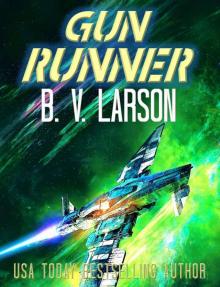 Gun Runner
Gun Runner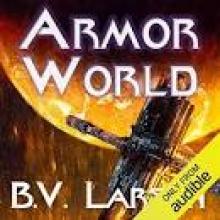 Armor World
Armor World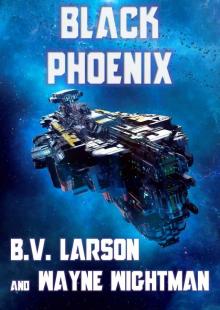 Black Phoenix
Black Phoenix Edge World (Undying Mercenaries Series Book 14)
Edge World (Undying Mercenaries Series Book 14) Hell's Reach (Galactic Liberation Series Book 6)
Hell's Reach (Galactic Liberation Series Book 6) Battleship Indomitable
Battleship Indomitable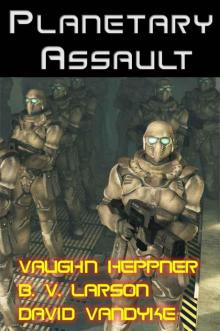 Planetary Assault (Star Force Series)
Planetary Assault (Star Force Series) Flagship Victory (Galactic Liberation Book 3)
Flagship Victory (Galactic Liberation Book 3)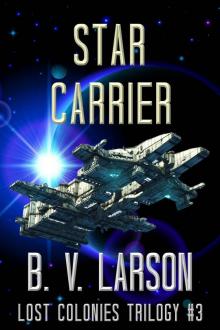 Star Carrier (Lost Colonies Trilogy Book 3)
Star Carrier (Lost Colonies Trilogy Book 3)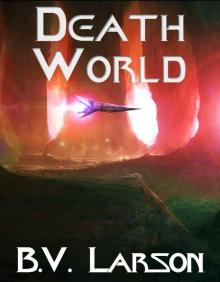 Death World (Undying Mercenaries Series Book 5)
Death World (Undying Mercenaries Series Book 5)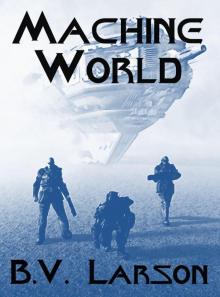 Machine World (Undying Mercenaries Book 4)
Machine World (Undying Mercenaries Book 4) Mech 2
Mech 2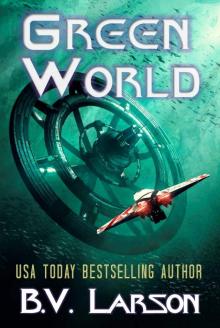 Green World
Green World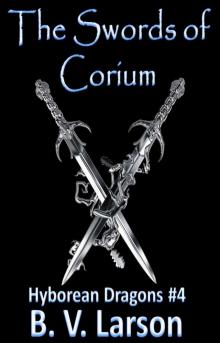 The Swords of Corium
The Swords of Corium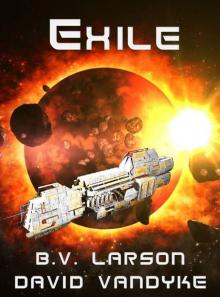 Star Force 11: Exile
Star Force 11: Exile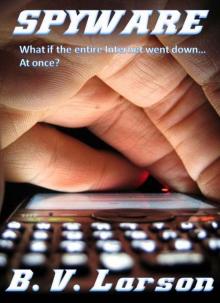 SPYWARE BOOK
SPYWARE BOOK Rogue World (Undying Mercenaries Series Book 7)
Rogue World (Undying Mercenaries Series Book 7) Blood World (Undying Mercenaries Series Book 8)
Blood World (Undying Mercenaries Series Book 8)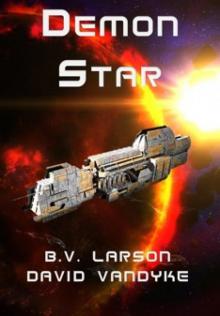 Demon Star
Demon Star Tech World (Undying Mercenaries Series)
Tech World (Undying Mercenaries Series)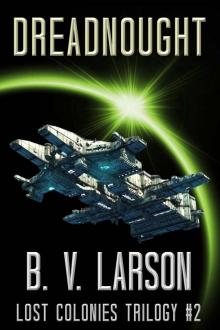 Dreadnought (Lost Colonies Trilogy Book 2)
Dreadnought (Lost Colonies Trilogy Book 2) Shifting
Shifting To Dream with the Dragons (Hyborean Dragons)
To Dream with the Dragons (Hyborean Dragons) Flagship Victory
Flagship Victory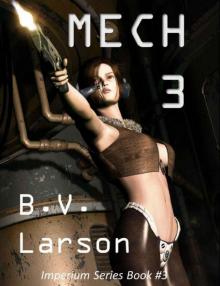 Mech 3: The Empress
Mech 3: The Empress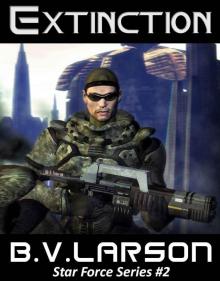 Extinction Ebook Full
Extinction Ebook Full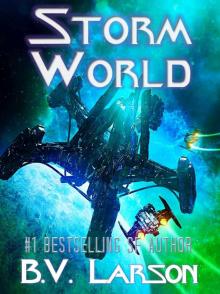 Storm World (Undying Mercenaries Series Book 10)
Storm World (Undying Mercenaries Series Book 10)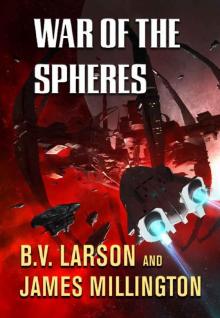 War of the Spheres
War of the Spheres MECH EBOOK
MECH EBOOK Storm Assault (Star Force Series)
Storm Assault (Star Force Series) Mech 4: The Black Ship (Imperium Series Book 5)
Mech 4: The Black Ship (Imperium Series Book 5) Technomancer
Technomancer Tech World
Tech World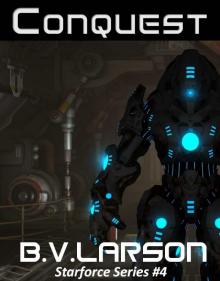 Conquest (Star Force Series)
Conquest (Star Force Series)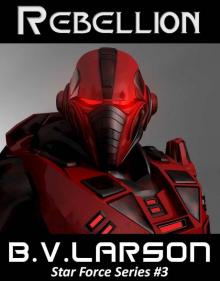 Rebellion sf-3
Rebellion sf-3 Dust World
Dust World The Dragon Wicked
The Dragon Wicked Rebel Fleet
Rebel Fleet Alpha Fleet (Rebel Fleet Series Book 3)
Alpha Fleet (Rebel Fleet Series Book 3)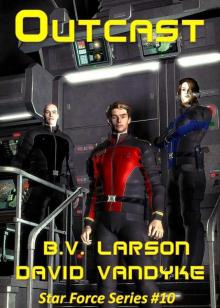 Star Force 10: Outcast
Star Force 10: Outcast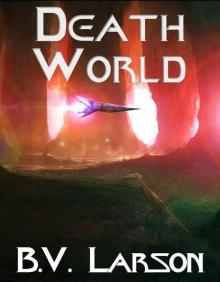 Death World
Death World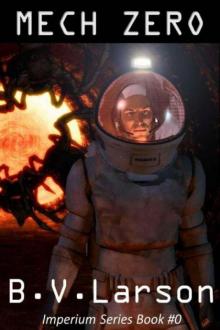 Mech Zero: The Dominant
Mech Zero: The Dominant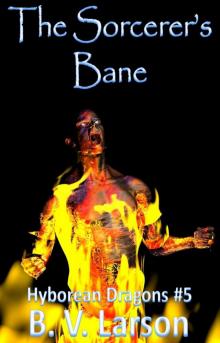 The Sorcerer's Bane
The Sorcerer's Bane Battleship Indomitable (Galactic Liberation Book 2)
Battleship Indomitable (Galactic Liberation Book 2) Haven Magic
Haven Magic Amber Magic (Haven Series #1)
Amber Magic (Haven Series #1)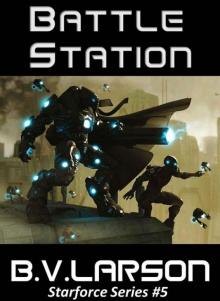 Battle Station sf-5
Battle Station sf-5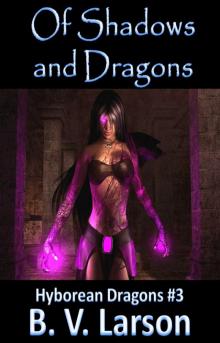 Of Shadows and Dragons
Of Shadows and Dragons Starfire
Starfire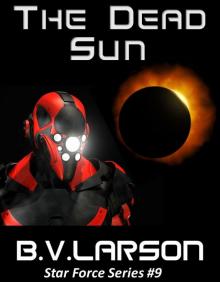 The Dead Sun (Star Force Series)
The Dead Sun (Star Force Series) Home World (Undying Mercenaries Series Book 6)
Home World (Undying Mercenaries Series Book 6)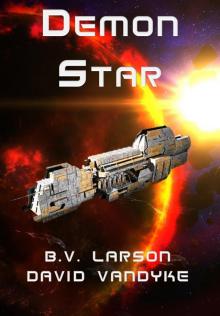 Star Force 12 Demon Star
Star Force 12 Demon Star Dream Magic
Dream Magic Home World
Home World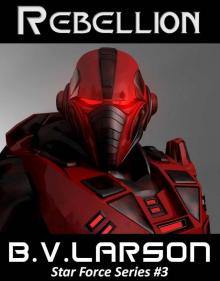 Rebellion Ebook Full
Rebellion Ebook Full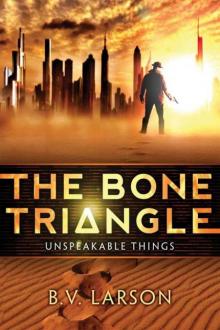 The Bone Triangle
The Bone Triangle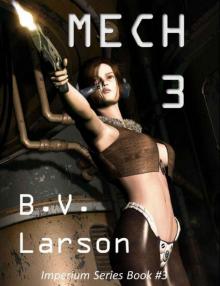 The Empress i-3
The Empress i-3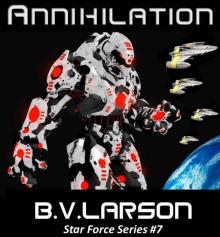 Annihilation (Star Force Series)
Annihilation (Star Force Series) Undying Mercenaries 2: Dust World
Undying Mercenaries 2: Dust World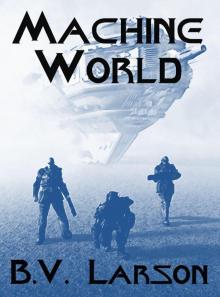 Machine World
Machine World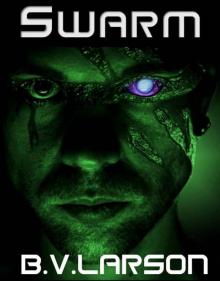 Swarm
Swarm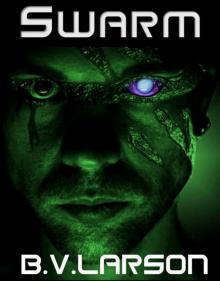 Swarm sf-1
Swarm sf-1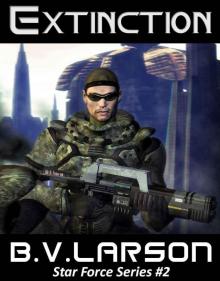 Extinction sf-2
Extinction sf-2 Amber Magic h-1
Amber Magic h-1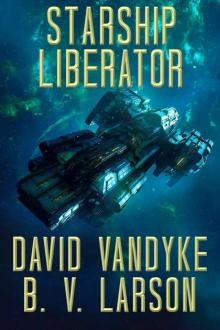 Starship Liberator
Starship Liberator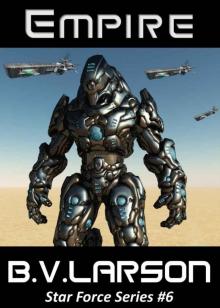 Empire Ebook Full
Empire Ebook Full The Dragon-Child
The Dragon-Child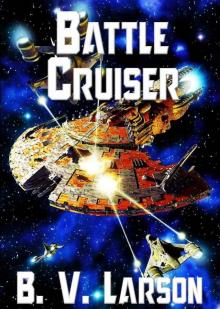 Battle Cruiser
Battle Cruiser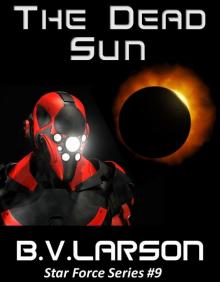 The Dead Sun
The Dead Sun Velocity
Velocity Creatures
Creatures Orion Fleet (Rebel Fleet Series Book 2)
Orion Fleet (Rebel Fleet Series Book 2)